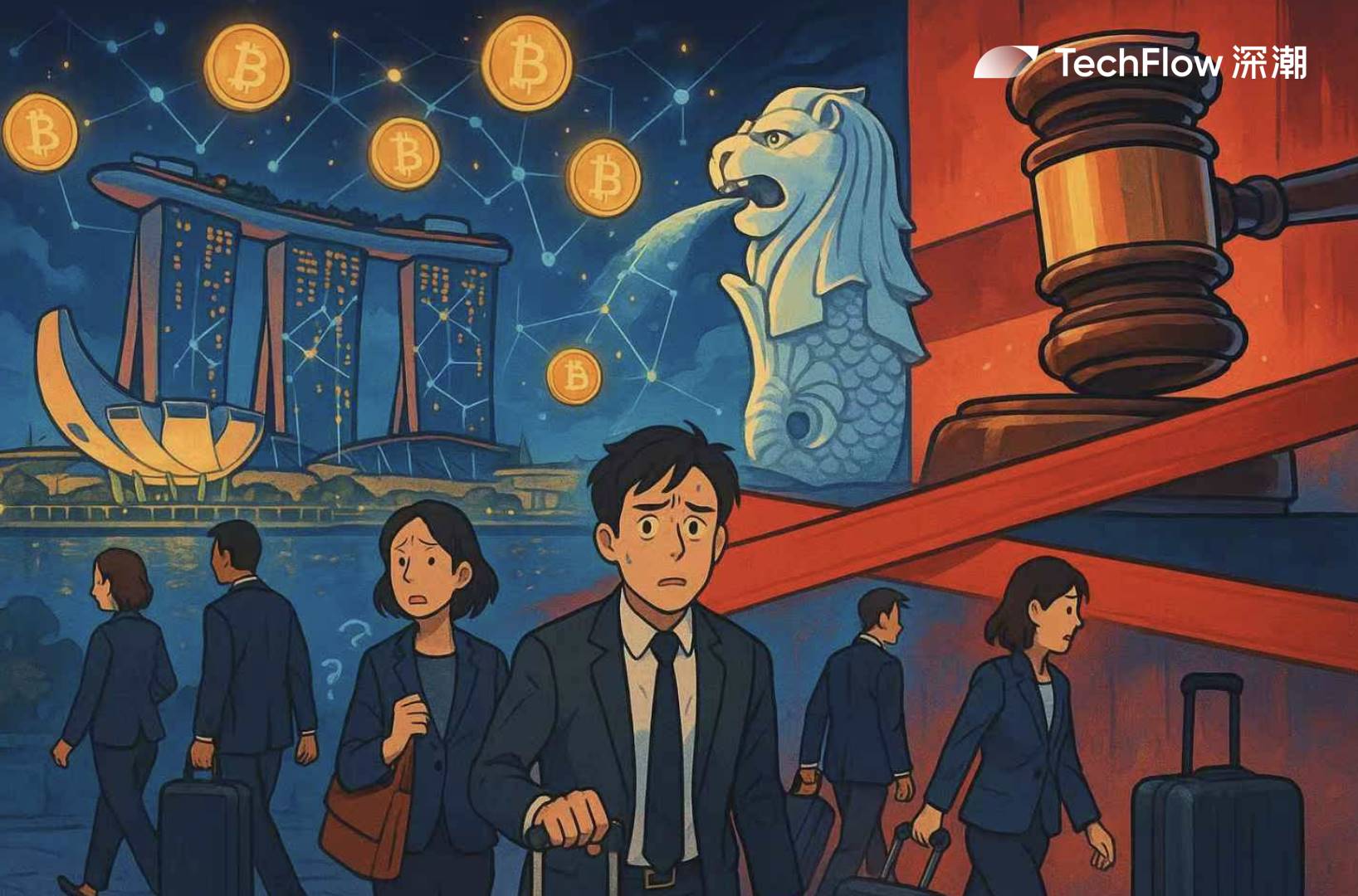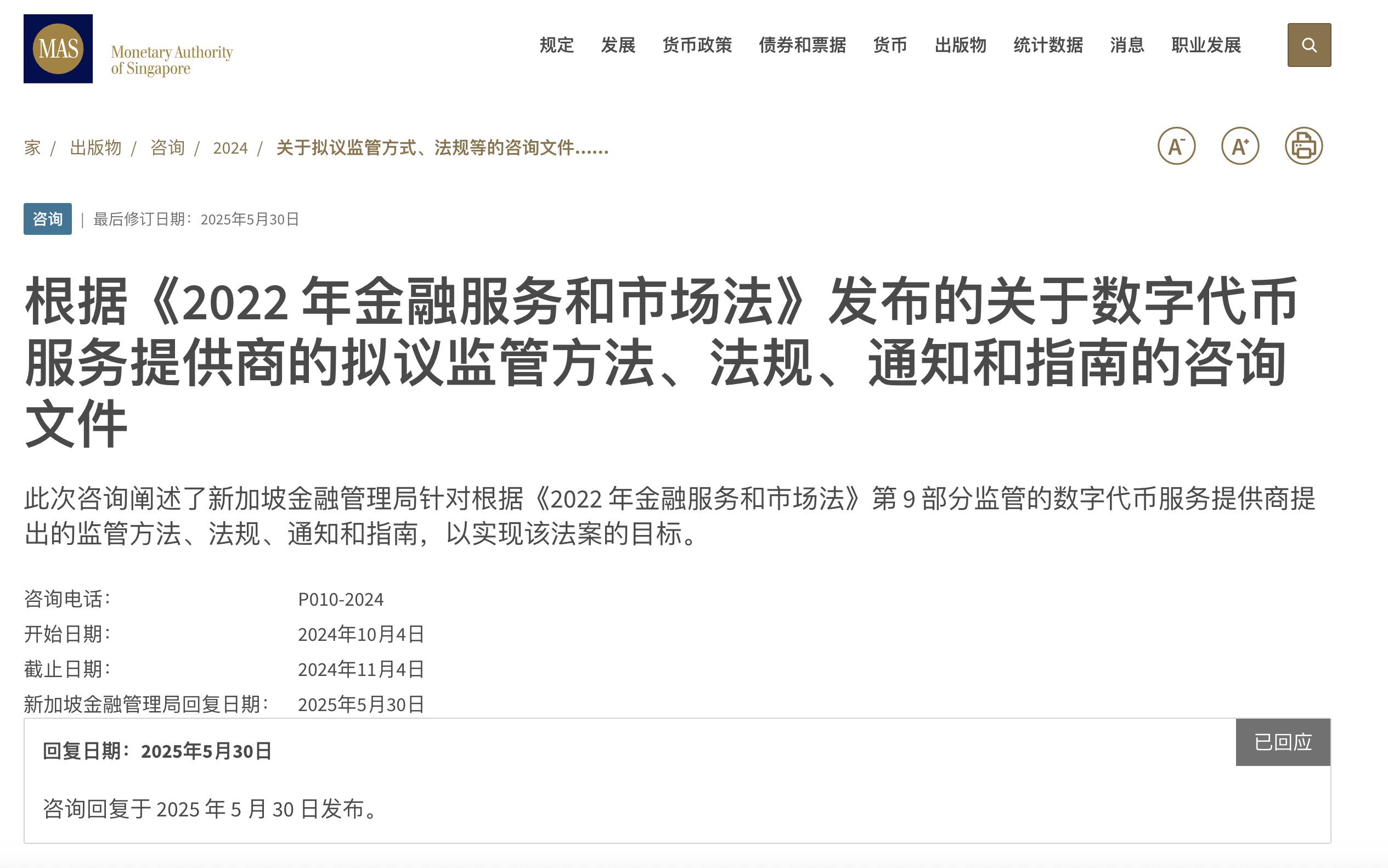Crypto Jews, continue to wander.
Written by: Deep Tide TechFlow

Once a paradise for Web3, Singapore is starting to push people away.
On May 30, the Monetary Authority of Singapore (MAS) officially released the final policy guidelines for "Digital Token Service Providers (DTSP)," with a very firm stance:
All crypto service providers registered or operating in Singapore must cease providing services to overseas clients by June 30, 2025, if they have not obtained a DTSP license.
There is no transition period for this regulation, and violators will be punished according to the law, with companies found in violation facing fines of up to 250,000 Singapore dollars (200,000 USD) and up to three years in prison.
This policy hit like a bolt from the blue, causing many cryptocurrency practitioners in Singapore to feel a jolt.
As Asia's Web3 hub, Singapore has long served as a perfect place for "regulatory arbitrage."
In the past, Singapore implemented a regulatory strategy that distinguished between local and foreign markets, allowing registered companies in Singapore to freely provide services to overseas clients, with stricter regulatory requirements only for businesses targeting the local market.
Especially as major markets tightened regulations with China's comprehensive ban and the U.S. SEC increasing enforcement, Singapore timely played the role of a safe haven, providing a secure landing point for numerous crypto exchanges, funds, and projects, leading to waves of crypto companies relocating. Even Singapore's sovereign wealth fund, Temasek, had previously invested in crypto companies like FTX and Immutable, solidifying Singapore's position as a crypto center in Asia.
However, the clarity of this regulatory policy has gradually plugged the loopholes for "regulatory arbitrage."
According to the final regulatory response document released by Singapore's MAS, the most stringent key points include:
Comprehensive regulation of cross-border business: Regardless of whether the clients are local or overseas, any digital token-related business conducted within Singapore must obtain a DTSP license, directly cutting off the previous regulatory arbitrage path of "registered in Singapore but only serving overseas clients."
Extremely broad definition of business premises: MAS defines "business premises" as "any location in Singapore used by the licensee to conduct business," even including movable stalls. This definition almost covers all possible business locations, regardless of size.
Dual coverage of individuals and institutions: The regulatory targets include both individuals or partnerships operating at business premises in Singapore and Singapore companies conducting digital token service businesses outside Singapore, achieving full coverage of entities.
Additionally, while MAS stated that employees of overseas companies working from home would be accepted, the definition of "employees" is vague, leaving it entirely to MAS's discretion whether project founders and shareholders qualify as employees.
Why has Singapore's MAS suddenly taken a strong stance?
This is not a sudden policy attack by Singapore's financial authorities on cryptocurrency companies. As early as 2022, Singapore's MAS introduced the "Financial Services and Markets Act," with the ninth part dedicated to the regulation of cryptocurrencies, followed by multiple public consultations and drafts for feedback. The document released on May 30 is a response to the consultations, detailing specific regulatory methods, regulations, notices, and DTSP licensing guidelines.

According to the consultation document, MAS's core consideration is "some cryptocurrency companies may harm Singapore's reputation."
The original text states, "Due to the internet-based and cross-border nature of digital token services, Digital Token Service Providers (DTSPs) are more susceptible to money laundering/terrorist financing (ML/TF) risks… The main risk posed by DTSPs to Singapore will be reputational risk, meaning that if they engage in or are misused for illegal purposes, it could damage Singapore's reputation."
The origin of all this may trace back to 2022 when Temasek's investment in the cryptocurrency exchange FTX and the local crypto fund Three Arrows Capital collapsed, severely damaging Singapore's financial reputation. The then Minister of Finance of Singapore, Lawrence Wong (now Prime Minister), publicly stated that this investment caused reputational damage, and Temasek subsequently imposed salary cuts on the investment team and senior management.
Under the latest regulations, which cryptocurrency companies will be affected?
According to the consultation document, all entities related to cryptocurrency asset trading must be licensed, including cryptocurrency trading platforms, cryptocurrency custody, cryptocurrency transfers, cryptocurrency issuance…
With the deadline approaching on June 30, 2025, panic from social media and friends circles looms over Singapore's crypto practitioners, but more emotions are confusion.
"I didn't know about the relevant policies before; it just exploded in my friend circle. Currently, opinions vary, and I can only wait and see. At worst, I can leave Singapore and go to neighboring Malaysia," said Adam (pseudonym), a project practitioner.
Kevin, a practitioner from a cryptocurrency exchange, expressed deep sorrow, stating that their company has already made plans to move the entire office to Hong Kong, but he does not know the specific timeline. Having lived in Singapore for two years, he was preparing to apply for Singapore permanent residency (PR), and now he feels regret and reluctance due to this change.
Previously, Hong Kong Legislative Council member Wu Jiezhuang posted on social media to attract Singapore's crypto practitioners to settle in Hong Kong, stating: "Singapore recently released the 'Digital Token Service Provider Licensing Guidelines,' proposing new policies for companies, institutions, and individuals engaged in virtual assets. Since Hong Kong released the virtual asset declaration in 2022, it has actively welcomed the industry to develop in Hong Kong. According to informal statistics, over a thousand Web3 companies have settled in Hong Kong. If you are currently engaged in related industries in Singapore and intend to relocate your headquarters and personnel to Hong Kong, I am willing to provide assistance and welcome you to develop in Hong Kong!"
Lily, COO of the crypto custody platform Cobo and former legal counsel of PAG, believes that the policy has been overly amplified in terms of panic. She stated that the policy maintains MAS's consistent regulatory style, and the main impact will be on the front-end and substantive operating teams of unlicensed exchanges in Singapore. It will not affect companies like Cobo that have already obtained exemptions and licenses, nor will it impact institutions whose business scope is outside the licensing regulatory scope.
According to information from the Singapore MAS official website, 24 companies, including COBO, ANTALPHA, CEFFU, and MATRIXPORT, are on the exemption list, while 33 companies, including BITGO, CIRCLE, COINBASE, GSR, Hashkey, and OKX SG, have already obtained DTSP licenses.
For these licensed and exempt companies, the new policy actually creates a fairer competitive environment, enhances the reputational value of licensed institutions, and lays the foundation for global expansion.
Correspondingly, as the era of regulatory arbitrage comes to an end, some offshore crypto companies based in Singapore have begun to relocate to places like Hong Kong, Dubai, and Malaysia.
Adam believes that the departure of crypto practitioners from Singapore is a major trend, and this policy is more about accelerating that process.
"The cost of living in Singapore is high, it's boring, and more importantly, there are too few opportunities to make money. If I want to live, I would go to Japan; if I want to make money, I would go to Dubai."
Once upon a time, Singapore was referred to as the "Jerusalem of Crypto Jews." Now, as its doors tighten, the crypto Jews have no choice but to follow the water and grass, continuing to wander.
免责声明:本文章仅代表作者个人观点,不代表本平台的立场和观点。本文章仅供信息分享,不构成对任何人的任何投资建议。用户与作者之间的任何争议,与本平台无关。如网页中刊载的文章或图片涉及侵权,请提供相关的权利证明和身份证明发送邮件到support@aicoin.com,本平台相关工作人员将会进行核查。




